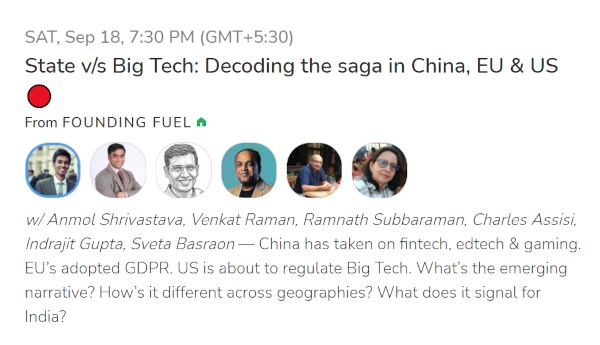[Image by David Mark from Pixabay]
The State versus Big Tech slugfest is the most compelling global narrative of our times. China rolled out a series of regulations. In Europe, the stringent General Data Protection Regulation (GDPR) in 2018 regulating the big players of the tech industry was a watershed moment. In the US now, the Biden administration is witnessing bipartisan support to regulate Big Tech.
It’s a global game, but it is playing out differently in different geographies. The histories and motivations are different, and the lessons are different too.
In this four-part essay, we explore the State Vs Big Tech conflict in China (Read Part 1 on China here), the EU (Read Part 2 here), and the US, and draw lessons from there.
Tech regulation in the US has attracted new urgency ever since Joe Biden’s election as the US president. The Biden administration’s decision to appoint Big Tech baiters like Lina Khan and Tim Wu as antitrust advisors has added new impetus to the regulatory ecosystem in the US. This is not the first time that the US regulators are discussing the need to regulate monopolies in the US. Earlier, Standard Oil and the Railways were targeted for their monopolistic business practices. In current times it is Big Tech that is at the receiving end of state regulations.
However, policy makers in the US are divided on the merits and demerits of tech regulations. A section of regulators swears by the virtues of the market and advocate minimal interference. They are staunch supporters of people like Ronald Coase, the British economist who has been quoted saying, “it will no doubt be commonly the case that the gain which would come from regulating the actions (in this case, Big Tech players) which give rise to harmful effects will be less than the costs involved in government regulation.”
On the other side, there are people like US senator Amy Klobuchar who are highly critical of the hypocrisy of Big Tech players. Klobuchar has cited the example of Facebook CEO Mark Zuckerberg, who has often been seen lauding the virtues of having a capitalistic system conducive to the emergence of ‘disruptive technologies’. Whereas, unsurprisingly, investigations found him encouraging Facebook to engage in monopolistic behaviour. Investigations of mails exchanged within Facebook bore ample evidence of Zuckerberg’s hypocrisy—he was quoted saying “it is better to buy than to compete.”
Pro-regulation policy makers contend that Biden's ‘Buy American’ plan necessitates the emergence of new players to give consumers a more comprehensive range of options to buy from. However, Big Tech players are swallowing up the new players in their nascent stage by buying off potential competitors. Moreover, this kind of poaching of new players by the established ones is likely to impact the employment scenario. That’s a side effect of Big Tech firms sourcing from East Asia and South-East Asia, which allows them to offer their customers competitive prices.
Tightening the Screws
Despite the divided opinion, there’s a new policy direction.
The US regulatory environment has witnessed the emergence of bipartisan support to boost antitrust enforcement at the Federal Trade Commission (FTC). The pro-regulation camp says that over the years, the FTC has lost its sheen. They argue that a regulatory body like the FTC had become a mere shadow of what it was previously. They contend that even during the heydays of Reaganomics when deregulation was the toast of the Reagan administration, the FTC was far more potent than today.
In recent times, there has been some consensus that the earlier regulatory regime invariably led to lengthy and complex litigations. Therefore, regulators started contemplating having a new regulatory regime where tech companies can be guided in their actions by a set of standard practices and policies relating to the tech domain. This will also enable the regulators to launch antitrust action against Big Tech whenever they engage in violation of individual privacy and check the monopolistic behaviour of Big Tech. In October 2020, a Congressional committee published a 449-page report on how the US should update its Company Law. After an extensive 16-month probe, the committee inferred that the Big Tech players have been abusing their monopoly power to act as gatekeepers to the marketplace. Some have argued that the lack of federal regulations has led to fragmented regulation, which hobbles state regulation of Big Tech in the US. With the regulatory environment differing from state to state, tech players enjoyed free rein, with some states adopting a minimalist approach while others were more proactive in business regulation. For instance, in 2015, when the Iranian nuclear deal was signed under Obama's leadership, Texas placed sanctions on companies with business interests in Iran.
In the last two years or so, new legislations have been introduced, prompting observers to opine that after decades of inaction, the state is striking back. In September 2019, Republican senator Joshua Hawley of Missouri proposed the SMART (Social Media Addiction Reduction) Act indicating a clear swing towards tech regulation in Washington DC. Like the EU, the US has also witnessed a two-pronged approach regarding tech regulation. One is to add more teeth to the enforcement of existing legislation to regulate the anti-competitive behaviour of significant tech players. Second, bipartisan support to draft new regulations to tame the robust tech sector dominated by giants like Alphabet and Amazon.
A Dashboard Act was proposed mandating tech companies to disclose the value of the data they collect. During 2018-2020, numerous proposals have been put forward to regulate Big Tech, covering various issues from online gaming, content moderation, and children’s privacy.
Congress has also witnessed the introduction of new acts to safeguard individual privacy. The US Consumer Data Privacy Act (USCDPA) and the Consumer Online Privacy Rights Act (COPRA) were some of the initiatives. More recently, Republican Senator Roger Wicker and others introduced the Safe Data Act to safeguard individual privacy. The Democratic Party leaders also introduced a new National Privacy Bill.
The California Way
The state of California, which was very active in regulating the automobile industry’s emission norms, is once again leading the way in drafting new laws to regulate the tech industry.
Many observers believe that the California Consumer Privacy Act (CCPA), identified as the American version of GDPR, has drastically altered the landscape of tech regulation in the US. It has already caused a spate of new legislation by federal lawmakers.
California is the fifth-largest economy globally, the largest market in the US, and home to some major tech brands like Facebook, Google, Yahoo, and Cisco, among many others. Therefore, CCPA regulations, many believe, will have a more significant impact than GDPR itself. Tech companies that are GDPR compliant must fulfill the mandate of the CCPA as well. CCPA also makes it mandatory for tech companies to audit data policies to create records of the information they retain. Like GDPR, CCPA necessitates that tech companies respond to individuals’ requests for data mapping. It also gives consumers the right to know what online information is collected about them and how it is used. Furthermore, it permits consumers to demand that their data be destroyed and sue companies for data breaches.
CCPA has been identified as the American version of GDPR, but in a more stringent form. There are three distinctive features of CCPA vis-a-vis GDPR: First, it adopts a broader definition of personal information, extending to internet cookies that identify users on websites, and forbids discrimination. Second, companies must enable Californians to opt out of selling personal data with a clean ‘do not sell’ link on the home page. Third, it applies to firms with revenues of $25 million or more that do business in the state or process the data of Californians based outside the state.
CCPA also has draconian penalties, with violators facing fines up to $7,500 for every violation of its mandates.
Challenges in Enforcement
The challenges associated with implementing anti-tech regulation are unique to the laissez-faire American state. To begin with, antitrust in the American system has invariably moved at a glacial pace. Further, antitrust experts are divided on the effectiveness of tech regulation. Additionally, the US judiciary has mainly been conservative in its approach to tick off the corporate sector. The conservative judiciary has been largely reluctant to punish the anti-competitive behaviour of the dominant corporate players. Cloaked in the ideological moorings of capitalism and inspired by the Chicago school of thought (with its tenet of free markets and minimal government intervention), the judiciary has primarily defended corporate interests because those in favour of regulations have failed to establish that the transgressions of Big Tech have caused ‘demonstrable harms’. Besides, tech companies, especially in the recent past, have played a critical role in driving economic growth in the US. Many voice the opinion that it is not advisable to clip the wings of this industry.
It is also being argued that it is impossible to break Big Tech due to deeply integrated technologies. For instance, some say that it is impossible to split a tech giant like Google. It is impossible to disintegrate the deeply integrated browsing and operations software functions.
A Demand for Federal Regulation
According to The New York Times, during the period December 2020 to May 2021 38 states in the US have introduced more than hundred bills to protect data privacy, regulate speech policies and encourage tech competition. As per the International Association of Privacy Professionals, for online privacy alone, states have proposed 27 bills, up from two in 2018.
The frenetic pace with which tech regulation is gaining ground has ironically led to Big Tech lobbying for federal statutes to regulate the tech industry. In the absence of federal regulations governing the tech industry, they argue that a balkanized regulatory system will severely hamper their business. In the months to come it will be interesting to see the extent to which lobbying by Big Tech will be able to moderate the techlash. The tech regulators have to contend with the very difficult act of balancing the need to regulate Big Tech and at the same time they would not like to stifle the innovation of tech players. For the regulators the challenge is to resist any overzealous regulation until and unless Big Tech’s activities lead to unambiguous outcomes in the form of ‘demonstrable harms.’
Editor’s Note
Part 4 of this series on State Vs Big Tech will be published on Friday, September 17. It draws the lessons from the regulatory scenarios playing out across the world. You can read Part 1 on China here and Part 2 on the EU here.
And join G Venkat Raman on Clubhouse for a chat on State Vs Big Tech: Decoding the saga in China, EU & US. Time: Saturday, September 18, 7.30 PM (IST)



